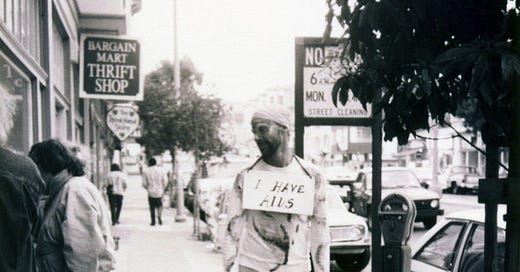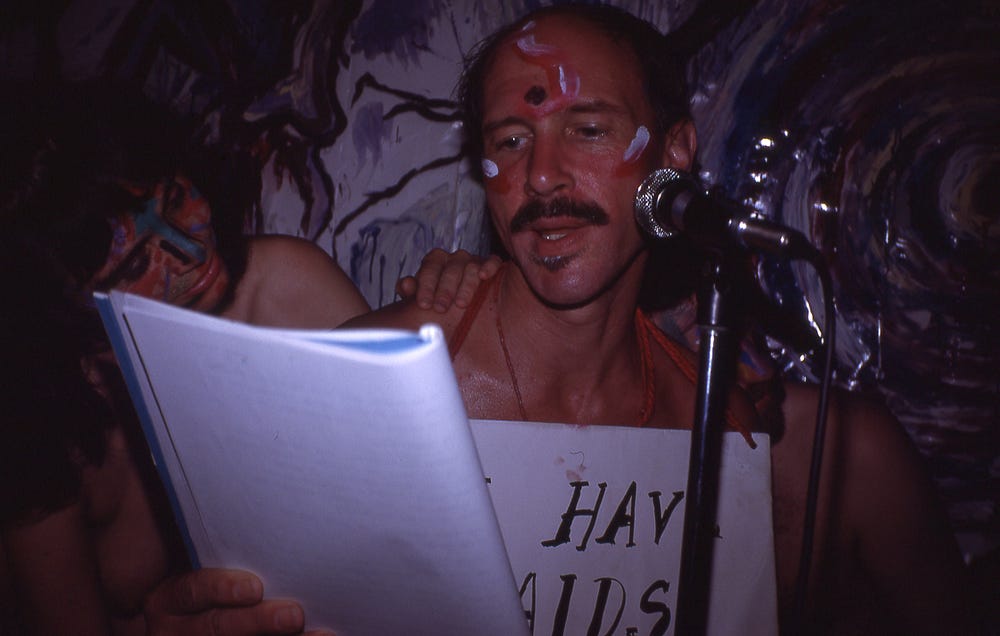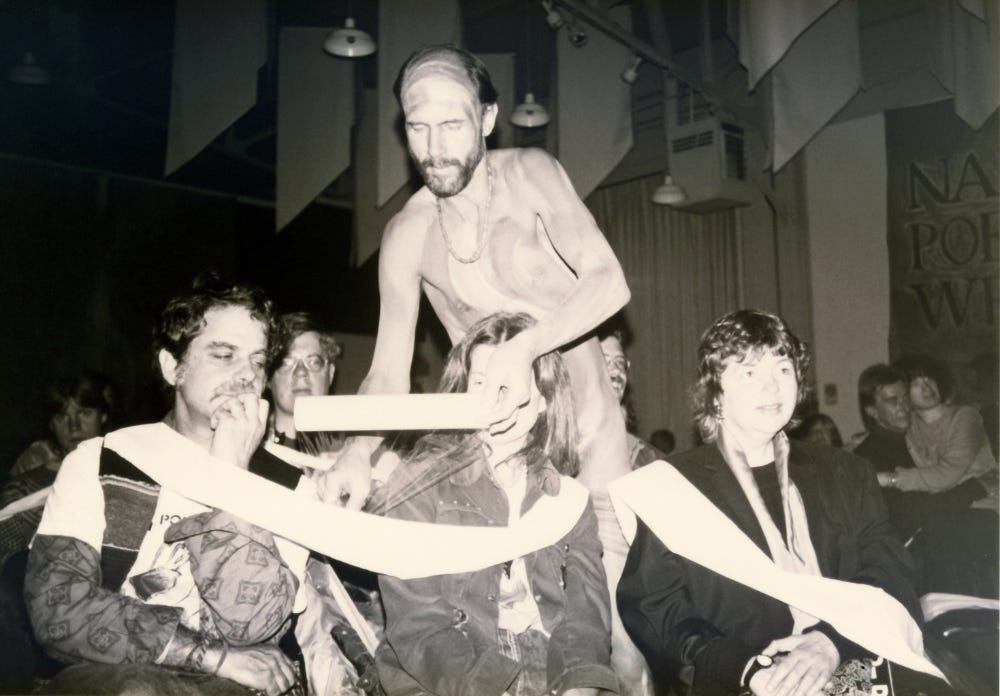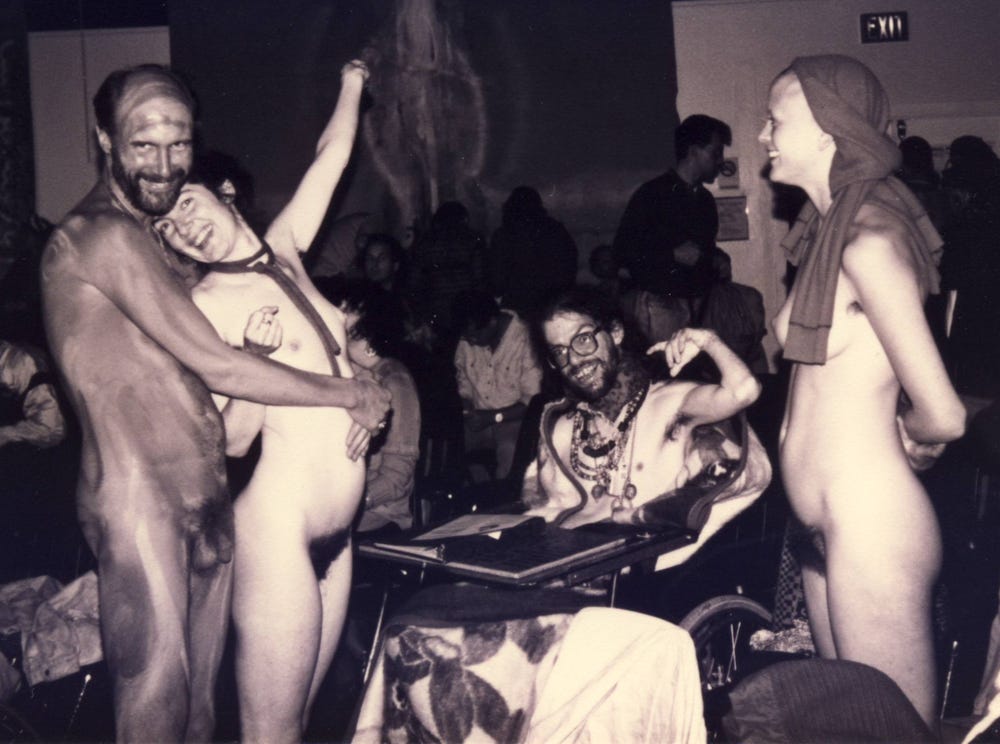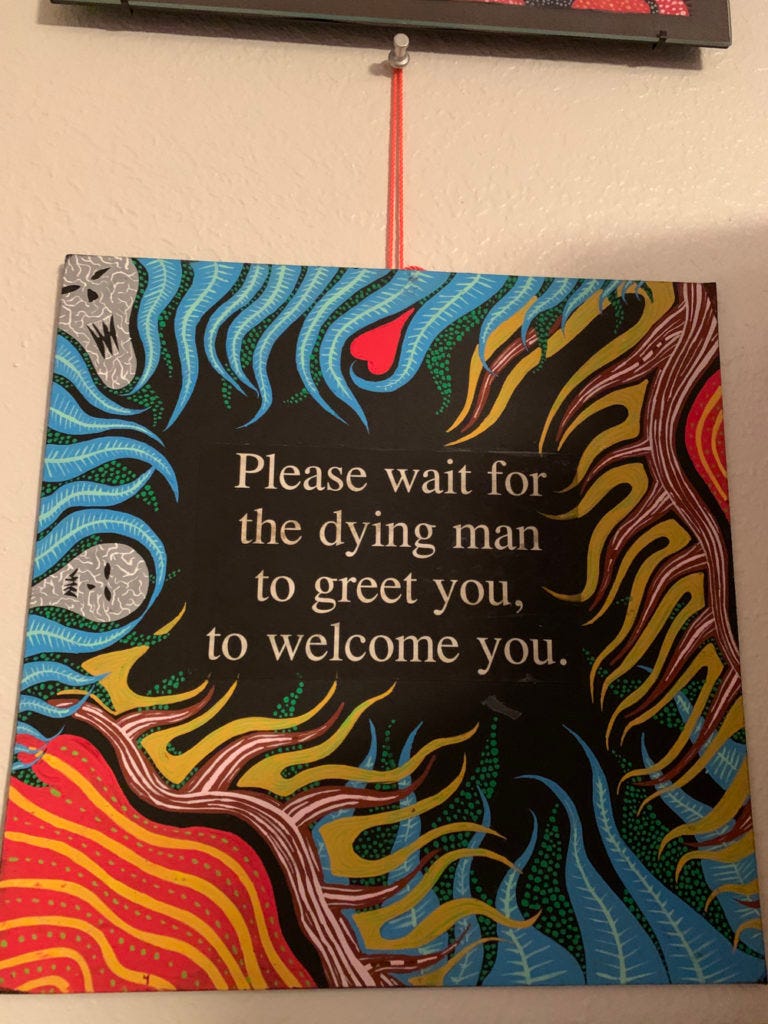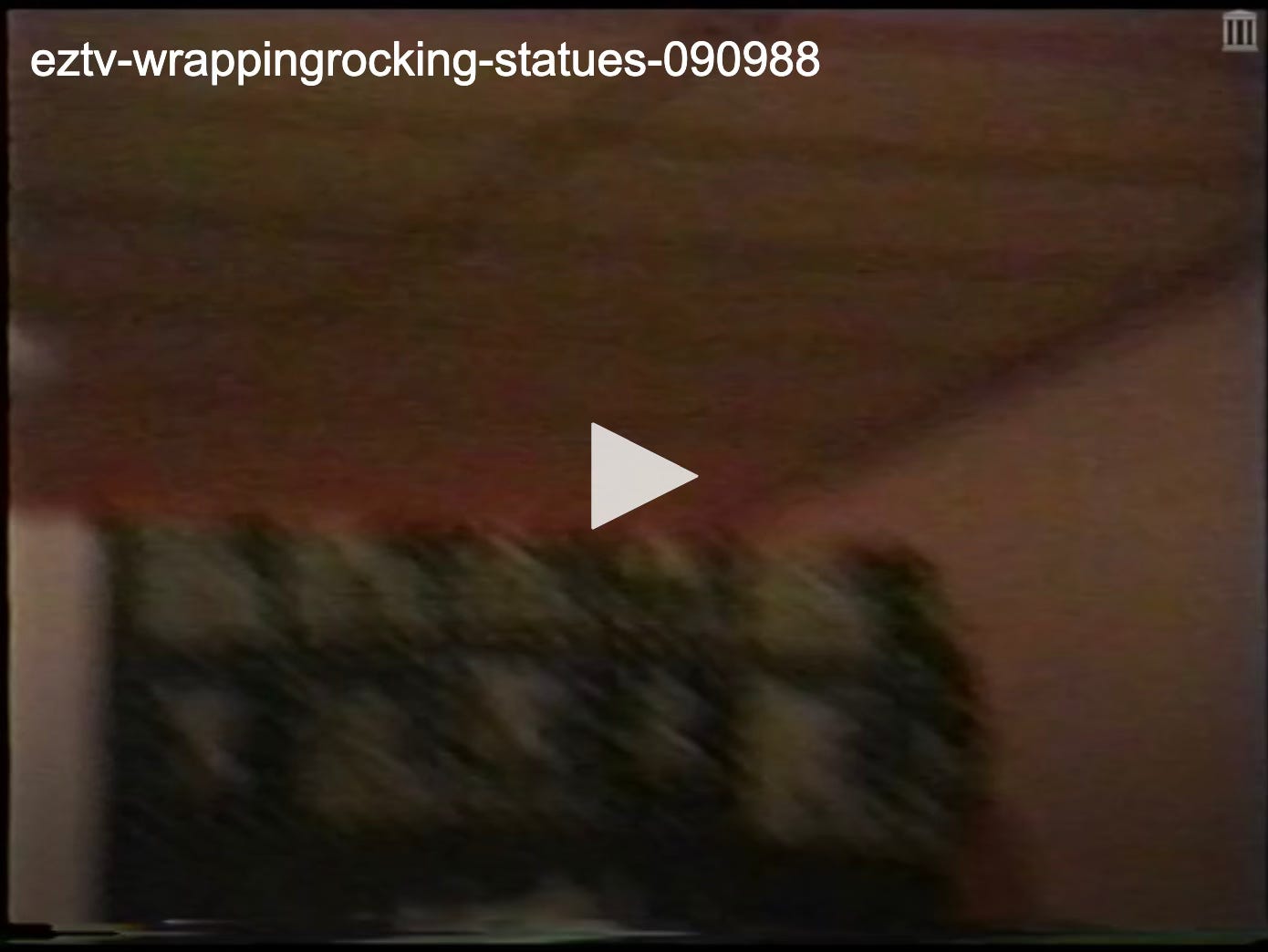Carlos
In the early days of people being diagnosed with AIDS, one of Frank's students, Carlos, got the AIDS diagnosis. Frank told him his job now was to bring death into life and to live and die joyfully. Carlos followed Frank in this and was a joy and inspiration to all of us around him.
Frank believed in type casting. After Carlos found out that he had AIDS, Frank cast him as the "dying man" in his performances. At the 5+ hour ritual performances Frank had nude, body painted Carlos wearing his "I have AIDS" sign around his neck inside of a small tent. Each audience member was led into the tent before entering the performance space and Carlos talked to them briefly about death, that it is not something to fear, that it is not painful in itself, it is part of life. When Carlos passed away he was in a very peaceful, joyful state of mind. When we got the word that Carlos had passed we looked at each other and said let's have ice cream sundaes!! (Eating ice cream was one of the indulgences Carlos allowed himself with Frank's encouragement, as part of his dying process.)
Below is a transcription of an excerpt of a conversation recorded December 10, 1995 at Father George's house in San Francisco. Frank Moore, Linda Mac, Mikee LaBash, Corey Nicholl, Father George, and Louise Scott were present. (Father George was a friend of Frank’s during his time in Santa Fe, New Mexico when Frank lived with Louise Scott and her family.)
Linda: What, the house? No, Carlos? Um, one of Frank's students, Carlos, died of AIDS-related stuff. And he'd been working with Frank for a few years when he found out that he had AIDS. And Frank said, "O.k., your job is to die as lustfully as you've lived, and to bring death into life." 'Cause it was a whole group of us that were part of like the community that were working with Frank, and doing performances and stuff too. And so, well he did fine for a long time ...
Frank: I ...
Linda: ... You cast him, Frank cast him as the dying man in performances, after he found that out. And so people, it was in the all-night ritual performances, people are lead in by nude body-painted dancers, and it's like all very ritualistic and quiet, and there's body music playing. And they would be lead to this little kind-of cave made out of back-drops, and Carlos would be in there, nude and body-painted with a sign that says he's the Dying Man. And it would be like two people at a time, and they'd be left in the room with him for like a minute or two, and he'd give them a rap about death. And he said, that death is not painful in itself. And it's not something to be feared, that it's just a transition. And then they'd be lead out. And most people actually didn't realize that ...
Louise: ... that he really was.
George: ... that he was really dying.
Linda: ... the dying man. And ...
George: Did he do it when he was really sick? I mean, did he continue doing it?
Linda: Yeah. Yeah. Yeah. Oh yeah, right up to the time he died. And at the point where his body really started to go ... he was like really fine up until that point. And then, he moved upstairs with a couple that had been his friends, so they could take more care of him. And they called us, and they said, they called us one afternoon and they said, "We're worried about Carlos because he won't get out of bed and he won't eat." And we had a tour coming up to Portland that Carlos was planning on going on with us. And so, Frank gets in the car, we drive over to San Francisco. Carlos is lying in bed, doing this Camille thing, you know, that was his like picture of himself dying. (all laughing) And Frank said, "Look, you have to look and see if you're dying or not. If you're dying, tell us, and we'll help you die. If you're not dying, (Frank screams), you have to eat, you have to start having fun with us. Eating, you have to be in shape to go to Portland." And he said, "Take the night to think about it, and tell me in the morning." And he said, he told Carlos that people are afraid to push him because they're afraid that he's gonna die if they push him. And he said, "I don't care if you die, because it's better to die than to live and be a wimp." And so, you know ... and next morning they call us and they said, "I don't know what you did, but not only is he eating but he insisted on getting up at the table." (George laughs)
And it kind of went up and down for a while. We started going to his house for sessions 'cause he was too sick to come to meet with Frank. And Frank had everybody ...
Frank: He came to ...
Linda: Oh, an all-night thing? Yeah. He had never gone to one of the twenty-four hour, like Frank does these twenty-four hour like workshop type things ...
George: Carlos had never gone?
Linda: ... and Carlos had never done one of them, and he really wanted to. So we had one scheduled, and he was in the hospital, and he got out like the night before, he was in and out of the hospital a lot. So he shows up with like, it was like a portable hospital room ... Well he was late. O.k., so ... when he had first started meeting with Frank years before, he was late for everything. And that was one of the first things that Frank said had to go. You know, "you have to be on time anytime you say you're gonna be some place." So he was always on time then. And now, here he is, like really sick, depending on other people, and he's like a couple hours late for this thing. And so, while we're waiting for him to come ... a lot of the people that were in the workshop had never, didn't know any of us. They were just doing this workshop they had signed up with to do with Frank. So Frank said, "Well I have someone coming who's gonna be playing the part of a dying man." And he starts giving this whole rap about how he's gonna pretend he's dying of AIDS, and he's going to da da da da ... And so Carlos shows up then two hours later with his entourage of like he's on oxygen, he has all these medications for his skin and all this stuff. And he's in tears. He's so upset 'cause he's late. And he comes in, "Frank!" You know, and he's like ... and Frank, you know, lets him talk for a minute, and he turns to everybody, he says, "This is him. See?"
And Carlos is looking, and Frank said, "I told them that you're playing the part of the dying man." And Carlos just looks at Frank and goes, "O.k., Frank!" You know ... (all laugh) And Frank had set it up so that he could set his own pace, 'cause we didn't know like what he'd be up for. And he said, just join in as much as you want. And by the end of it, he was off oxygen. He like was totally, you know, back into everything and he was involved in everything, through the whole thing. He didn't like take a break at any point. And he said that it, you know, he felt a lot better at the end of it. And the process of him, he would kind of go in and out of being o.k. ...
George: Yeah. That happens pretty regularly.
Linda: Yeah. At one point when we were over there, he told Frank that Frank didn't know what it was like to have to depend on people for your every need. (all explode screaming/laughing) Which he denied saying. He said, "Frank, you made that up. I never said that." The thing would be, Frank had, you know, everybody that was part of this little community, somebody was with him all the time, and they'd just hang out with him, or play cards or just whatever, you know. And he would be this, (plays Camille) like "Ohhh ... you knowww ... I'm in soooo ..." Like that. And then we'd get a card game going. Boom. He's sharp, he's fine, nothing hurts, he's winning. (all laugh) You know, and so ... that was like during his period when he's going in and out of things. One time he's in the hospital and the Portland trip is approaching and Frank had told him he has to be able to walk, you know, to go on this tour. And, we get there and it turns out, he's not walking. He's not getting out of bed, he's not moving.
George: He's in the hospital at this point.
Linda: Yeah, he's in the hospital, this is one of those like three or four day things, and then he'd be in and out for different things. And, Frank said, "O.k., I told you you should be walking. I want you to lean on Michael," and another guy that was with us, Rourke, "and walk as far as the door and back to your bed." And he says, "Well I'm not gonna lean on anybody then. I'm just gonna walk." He gets to the door, and the door is open. He waits 'til he gets to the frame so that he's in view of the nurse's station, and GRABS onto the frame, trying to get Frank in trouble!
And Frank just yells at him, and says, "I told you to lean on Michael and Rourke. Now you lean on them to get back to bed." And that all happens, and he goes through this trauma over that, and we play cards, he's fine, you know. And we're leaving and the nurse calls us over and she said, "What did you do to get him to walk?" It turns out that they'd been trying to get him to walk. He said he needed a physical therapist. They brought a physical therapist. The physical therapist said, "You should be able to walk."
"Oh no, I need a doctor." They bring a doctor: "You should be able to walk." No, he can't walk. And then they see him walking, you know. And so Frank said, "Well, not only that. He's supposed to walk a step more each day." The nurse said, "Fine, I'll enforce that." (all laugh)
So by the time he died ...
George: You should have billed him. (all laugh)
Frank: Uh huh!
Linda: You did! Oh yeah, he paid. He paid all the way to the end. By the time he died he was pretty consistently at peace with it, and a pretty jolly soul with it all. It was very neat, and ... so it actually felt, you know, it wasn't as drastic a thing when he died, 'cause he was so kinda right there with us. Yeah.
Frank: We ate ...
Linda: Right. The day he died, we decided ... you know, his whole thing when he was dying was that, his fantasy had been having ice cream or something, something like that. And Frank said, "Pffft, you know, you're dying, have as much ice cream as you want." So he used to have the people he was staying with make him milkshakes, so he could get up in the middle of the night and drink a milkshake if he wanted it. So, the day that he died, we're sitting there, and we said, "Well, let's have a sundae." You know, so that started like a ritual. So on his birthday and on his death day we go out and we have these decadent sundaes, and it never makes us sick, you know ...
George: (laughing) Banana splits ...
Louise: Right, you just do it.
Linda: ... if we did that on any other day, it would be like "Ooohhh." You know, but we do that ...
George: Oh jeez ... People do dance around dying, though. We've certainly, we have people who come this close, you think they're gonna be gone in two hours, and then they back away. And then ... for another couple months, and approach it again, and back away. Just never know ...
Linda: Yeah.
George: ... but we've never had anyone eating ice cream on the way out. (laughs)
Frank: Carlos was joking ...
Linda: ... with the nurse, as he died. Right. He was getting a transfusion, and he was joking with the nurse, and he just passed.
George: He was getting, what, how did, did he have cardiac arrest, you know, was that the thing ...?
Linda: I guess that was it. Did he have cardiac arrest as he was having the transfusion? (Frank - yes) Yeah. Yeah.
This is the text that displayed in the "Dying Man" tent along with a large photo of Carlos wearing his "I have AIDS" sign at performances after Carlos died:
I AM CARLOS. FOR THE LAST YEAR, MY ROLE IN THESE DREAMS HAS BEEN TO GREET THE PEOPLE, AND TO PREPARE THEM FOR THEIR DEATH WHICH THEY (AND YOU) WILL EXPERIENCE IN THIS DREAM. I TOLD THEM THAT DEATH IS NOT SOMETHING TO BE FEARED, SOMETHING THAT IN ITSELF IS NOT PAINFUL. I TOLD THEM, IN MY MARVELOUS VINCENT PRICE VOICE, THAT DEATH IS A PART OF LIFE TO BE LUSTFULLY RELISHED AND ENJOYED.
I WISH YOU COULD HAVE HEARD MY VINCENT PRICE. I TRIED TO GET HERE IN MY BODY, WHICH WAS FINALLY FITTING THE BODY OF THE DYING MAN. I EVEN FANTASIZED ABOUT DYING HERE WHILE I WAS TALKING TO YOU ABOUT DEATH. BUT THAT WAS NOT TO BE. 2:35 P.M., JANUARY 30, 1989, MY HEART STOPPED. BUT I AM HERE WITH YOU BECAUSE LIFE, WHICH DEATH IS A PART OF, GOES ON.
WHEN I FOUND OUT A YEAR AGO I HAD AIDS, THE KNOWING I WAS DYING LIBERATED ME SO THAT I COULD LIVE MORE FULLY, MORE HAPPILY, MORE OPENLY, MORE PEACEFULLY THEN I EVER LIVED BEFORE. FRANK, ALWAYS A BELIEVER IN TYPE-CASTING, CREATED FOR ME THE DYING MAN ROLE TO SPREAD THE LIBERATION TO PEOPLE WHOSE DEATHS ARE NOT IN SIGHT. A LOT OF PEOPLE THOUGHT THE "I HAVE AIDS” SIGN I WORE AROUND MY NECK AND THE DYING MAN WERE FICTIONS OF THE ART. BUT WHEN THEY DISCOVERED THAT I WAS REALLY DYING, THE DREAM BROKE OUT OF ART, AND INTO THE REALITY OF EVERYDAY. I HOPE BY MY BEING WITH YOU IN THIS WAY IT WILL SPREAD THE LIBERATION TO YOU.
Videos with Carlos
EZTV – Wrapping/Rocking & Statues
Los Angeles, California, September 9, 1988.
Playing with Reality
(in two parts)
Berkeley, California, November 19 & 20 1988
The Outrageous Horror Show
Berkeley Square, Berkeley, California, October 29, 1988

